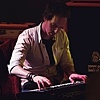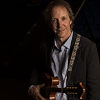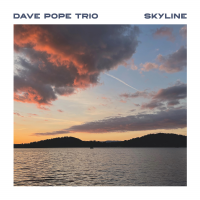Home » Jazz Articles » Interview » Dennis Coffey: Hot Coffey and The Pursuit of Excellence
Dennis Coffey: Hot Coffey and The Pursuit of Excellence

All I know is one thing: I did my first record date at age 15 and got paid for it. That was a good thing right there.
—Dennis Coffey

Dennis Coffey
guitarb.1940
You may not know Dennis Coffey by name, but you sure know the sound of his guitar. In the late 1950s and early '60s, that sound was a fixture on recordings from local Detroit labels plus national acts like Del Shannon. In 1966, Coffey replaced guitarist
Don Davis
saxophone
Lyman Woodard
organ, Hammond B31942 - 2009
On Record Store Day in November 2016, Resonance Records released Hot Coffey in the Big D: Burnin' at Morey Baker's Showplace Lounge, which captures all of Coffey's incendiary, transcendent guitar glory from a 1968 show with the Woodard Trio in that small Detroit club, as a limited-edition vinyl LP (and subsequently in other formats in January 2017).
Hot Coffey in the Big D: Burnin' at Morey Baker's Showplace Lounge pours out steaming hot cup after cup of sticky thick, bluesy and jazzy instrumental soul. Recorded by Coffey's longtime partner Mike Theodore from Theodore's studio right up the street, Burnin' captures a typical, which is to say typically brilliant, set: Timeless blues ("Wade in the Water"), contemporary covers (Jimmy Webb's "By the Time I Get to Phoenix" and "The Look of Love" by

Burt Bacharach
composer / conductor1928 - 2023

Herbie Hancock
pianob.1940
Hot Coffey in the Big D compiles an seven-song primer on the best of Coffey's style: The free and open, soft jazz touch that opens "Phoenix," his supple yet crunchy psychedelic serpentines in"Fuzz," his deep blue liquid dives into "Wade in the Water" and so much more. Their sound is pure soul; their spontaneous intricate interplay is pure jazz.
Of course, the Motown sound wove throughout 1968 Detroit, and Woodard and drummer Melvin Davis had their own connections, Woodard with Martha Reeves and The Vandellas and Davis as

Smokey Robinson
vocals
Jimmy Smith
organ, Hammond B31925 - 2005
"It was a great time for us to be able to not only play what we enjoyed, but to see audiences come and listen intently," Coffey reflects. "This is something I will always remember."
Coffey kept making his own music too. His first solo album Hair and Things (1969, Maverick), with covers from the musical Hair ("Let the Sun Shine," "Aquarius") and

The Beatles
band / ensemble / orchestra
Quincy Jones
arranger1933 - 2024

Johnny Taylor
pianoSoul entrepreneur Clarence Avant signed Coffey and Theodore as producers for his fledgling Sussex Records label, for which he was rewarded when the duo produced the 1972 debut album Nice to Be With You by Gallery (a band that Coffey and Theodore more or less assembled in the studio around singer-songwriter " data-original-title="" title="">Jim Gold), which launched three Top 40 pop hits.
Sussex also released Coffey's own hit single, the scalding and icy instrumental "Scorpio." It was the rare instrumental single to sell a million copies and break into the pop Top 10. And although no one could know it at the time, its crunching and lengthy (nearly half the song) breakdown featuring Funk Brother drummers Uriel Jones and Richard Allen and bassist Bob Babbitt became a foundational sampling pillar for rap and hip-hop in the following decades. "The original break is wide stereo, hi-hats over in one channel, kicks and snares in another," London-based drum and bass producer Charlie Fracture once explained. "That gives you a lot of options."
"I think that's what broke 'Scorpio,' and a lot of my records," Coffey agreed. "I had the guitar parts out in the open—they could grab it, sample it and then loop it, make other records around it."
Coffey published his memoir Guitars, Bars and Motown Superstars (University of Michigan Press) in 2004. "My major influences were guitarists Scotty Moore (with Elvis),
James Burton
trombone
B.B. King
guitar, electric1925 - 2015

Chuck Berry
guitar, electric1926 - 2017

Wes Montgomery
guitar1923 - 1968
In 2011, Coffey was honored with a Distinguished Achievement Award by the Detroit Music Awards and released an eponymous solo album for Strut Records to global acclaim. Through every phase of Coffey's career, the sound of Detroit rumbles like a wide-open freeway. "In my estimation," wrote producer Zev Feldman for the set's companion booklet, "Dennis is one of the baddest cats ever; he just hasn't gotten his due as a soloist—until now." And just about every Tuesday night, you can find one of the baddest cats ever ripping things up at the Northern Lights Lounge—just "two miles away from Motown," Coffey brightly notes—on Baltimore Street in Detroit.
All About Jazz: You still hold down a weekly gig at the Northern Lights Lounge in Detroit. Who are you playing with these days?
Dennis Coffey: I have my own band. I have " data-original-title="" title="">Phil Whitfield on organ, I have Julian Vanslyke on drums, and then three Tuesdays out of the month I have guest vocalists: Pat Smilie on the first Tuesday, Theo Spight on the second Tuesday, and Lady Champagne on the third Tuesday. I play thirty minutes of my stuff and then I bring the singer up. This is my eighth year of doing this every Tuesday night when I'm not on the road. Last Tuesday night, the place was absolutely packed all night and there was a film crew in doing a segment for a documentary on Motown, so it was pretty wild.
AAJ: Who gave you your first guitar and who or what were some of your earliest inspirations to play it?
DC: My mom and dad were divorced since I was real little. My mom's boyfriend gave me this guitar he had in his closet. I had not had a guitar in my hands, and somebody neglected to tell me that you can't play a Hawaiian guitar with a high action for a steel bar like you play a regular guitar. I was kind of screwing around with it but I couldn't play it. So I took it over to a music store and they converted it, changed the bridge and fixed it, so I could play it then. That's the first one I had. I horsed around with that one for a while, then my dad took me to a pawn shop in downtown Detroit and I bought, I think it was a Harmony acoustic, guitar for fifteen dollars. That was my first real guitar—I thought, anyway.
AAJ: Hot Coffey in the Big D was recorded in 1968, which was such a fertile time for progressive and popular music—especially soul music. So it makes sense to ask you about three guitarists who were popular playing soul music at this same time but who played it quite differently from you. First, your thoughts on

Jimi Hendrix
guitar, electric1942 - 1970
DC: He was definitely the psychedelic guy. He was using a wah-wah pedal, him and

Eric Clapton
guitar and vocalsb.1945

Diana Ross
vocalsWhile I was playing with Lyman Woodard and Melvin Davis, who you hear me with on this CD, we opened up for the MC5 at The Grande Ballroom, which was the mecca for all the rock groups, especially from England—they all played at The Grande. We opened up for the MC5 there. I was doing an instrumental version of "A Day in the Life" because

Wes Montgomery
guitar1923 - 1968
AAJ: One of your early singles was The Isley Brothers' hit "It's Your Thing": How about Ernie Isley?
DC: I listened to him and thought he did a good job with The Isley Brothers, but by then I was doing my thing. Ernie did a good job. I did like the tone that he had, I think he ran a fuzztone through a phaser or something and had a nice tone. But that's about all with him, I think. He's a good player, there's no doubt about it.
AAJ: There's one more guitarist I want to ask you about but, first, does the way you open "By the Time I Get to Phoenix" sound like

Kenny Burrell
guitar, electricb.1931
DC: I was a fan of Kenny's—you know, Chitlins Con Carne—and he was from Detroit. I got to meet him once or twice, when he played at Baker's here in Detroit and I saw him at The Minor Key, I think. Yeah, when we were all teenagers, he was a little bit older than we were but he was certainly somebody that we liked. He had a good funky sound. I liked Kenny. I just liked Wes better, I think.
AAJ: And then finally, who one might call your counterpart from Memphis,

Steve Cropper
guitar, electricb.1941
DC: I met Steve Cropper once, when I got the Funk Brothers award in Philadelphia from the Rhythm & Blues Foundation. He was there, so I met him that one time. But I went to the Stax Museum in Memphis when I played at the Gibson Guitar Hall of Fame in Memphis, and I saw all " data-original-title="" title="">The Dramatics stuff up there, which I played on.
Don Davis
saxophone
Johnny Taylor
pianoAAJ: Hot Coffee in the D offers two covers by two of the greatest songwriters or songwriting teams in history. Why did you choose to cover "By the Time I Get to Phoenix" and have you covered any other Jimmy Webb tunes?
DC: You know what, I just liked the song. Here's how it usually worked with Melvin and Lyman: I would pick a song I liked, a Wes Montgomery song or whatever, and I would just learn the song myself. Then I would write a chord sheet out and hand it to Lyman and tell him we were doing this song. We never rehearsed —I'd just count it off and we'd go! Organically, the songs kind of arranged themselves, you know?
AAJ:Have you covered any other

Burt Bacharach
composer / conductor1928 - 2023
DC: I did a session for Hal David when I was living in L.A. back in the '70s. I was doing about eighteen sessions a week in Detroit and eighteen sessions a week in L.A. I just remember meeting him while I was there, and did some session work on some stuff he was working on.
From time to time, I'd do a cover of a Beatles song or something—I did "Hey Jude" on an album a long time ago. There's a whole other CD of material recorded at the same time as this album, and the label has already mentioned to me that maybe there'd be another release somewhere down the road. There's a lot of songs in there that were covers, probably "Hey Jude" and some others ones I can't remember. It was a few years ago.
AAJ: The two originals on this set seem to capture a mood as much as a sound: Share a little bit about the two originals on this set: "Fuzz" and "The Big D"?
DC: Those kind of came in while Lyman and I were just horsing around with some chord changes and he came up with some ideas and then I came up with some melodies for them. Same kind of deal: They just kind of evolved on the gig.
AAJ: Your website says that you also recorded with

George Clinton
vocalsDC: Yes, I did George Clinton's first hit, "I Wanna Testify" when he had The Parliaments. That was me and Eddie Willis on guitars. Then they brought me into the studio to overdub guitar parts and wah-wah and all that stuff for the first Funkadelics album. I don't know what the songs were, but I played with those guys on that first album.
AAJ: Your new album also includes your version of

Herbie Hancock
pianob.1940
DC: Herbie, of course, is a great player and a great writer. The idea of that song, harmonically, is kind of advanced the way it lays out. It's almost like having a minor ninth—say, if you had an A minor ninth, you'd have a D in the bass, that was pretty much the harmonic structure. If you notice, when you're playing that tune, the melody's really nice and you're doing it in a certain tonal area, and then you move up into another tonal area, and as it comes back to the head, because of the way Herbie wrote it, you're a half-step below where you started from, so it gives us a nice bump when it goes back for the return. I just liked the song. It's a nice tune.
AAJ: How did you get involved with the Sussex label and how much work did you do on the #1 Gallery hit ("So Nice to Be With You")?
DC: Mike Theodore and I are partners on this new album and we've been partners for about twenty-five years. I first met Mike at Golden World Studios. He was hanging around trying to do some stuff and I was doing sessions there, and the producer, Don Davis, asked me to put strings on one song. I was majoring in music at Wayne State University, studying arrangement and harmony and theory and all that stuff, so I said sure. I got some students from Wayne, wrote out the string parts, brought them in and put strings on that record.
Mike Theodore saw me conducting the string session. He approached me about an artist who was being produced by Don Mancha for Scepter Records. Mike had been doing the rhythm and horn arrangements, but the producer said that he wants rhythm, horns and strings, and he noticed that I knew how to write for strings. I had only done that one arrangement but I said, sure, I'm an expert string guy. So we hooked up on that session. What began as partners as arrangers developed into partners as producers.
That was the beginning, and then we ended signing with Clarence Avant as house producers for Sussex Records. We functioned like A&R guys: We found the talent. We did whatever we had to do to convince Clarence to sign the talent. Then it was our job to take the talent in and record the album. We were like creative directors. We ran the show: It went from finding the talent to all the arrangements to okaying the final test pressing. That was our job. We used to do all that stuff.
We learned how to produce when we were working at Tera Shirma Studios. Ralph Terrana gave us an office and keys to the studio there. I'd be playing in a club and get off at 2:00AM. All my cronies and singers I knew were all working clubs all over the city. We'd pick out a band that we liked and they'd meet us at the studio at 3:00AM. Mike would engineer and I would play guitar and conduct the rhythm section, and we'd record all of our buddies, trying to get them deals. That's how we learned how to produce.
So we were driving down Detroit's famed Eight Mile Road and we saw this little, small bar. It was in the middle of the week, and the parking lot was just full, it was packed. We wondered what was going on, so we pulled in, and there we saw " data-original-title="" title="">Jim Gold singing and playing acoustic guitar and he had another guy playing guitar—two guitar players, and they're just packing the place. That's how we got onto what he was doing and found out he had written songs. Then we just hired and put the studio guys together behind him and his buddy and recorded that album.
AAJ: Where did the icy, ringing sound of "Scorpio" come from? Why that title, and what was the label's reaction to releasing an instrumental with such an extended bass and drum midsection?
DC: Here's the deal: Clarence Avant was very supportive of Mike Theodore and I. Very rarely did he turn something down. By now, Mike and I had progressed into being ace arrangers. I used to go over to Mike's house and bring my guitar and he'd sit at the piano and we'd get these monstrous score pads and by the end of the day, we'd have the whole string section, eight horns, the rhythm section and all the other stuff for forty pieces. Then we'd look up all these weird instruments in the dictionary, find somebody in the union who played it, called them up and asked them, "Do you play this? What does it do? Well, we're overdubbing on a session—bring it down!"
So while we were doing all that, I thought to myself, "What if, instead of writing all these parts for horns and strings, I write them for guitars?" And I came up with this guitar band concept. So I sat in my basement and I wrote ten songs, and "Scorpio" was one of them. I put down the melody and then used a Sony sound-on-sound recorder to add stacks of guitars playing the string parts and horn parts. I played it for Mike and he said, "I like it. I like the concept and the ten songs. (We used nine of those songs on the Evolution album.) I'm going to sell this idea to Clarence." He sold it to Clarence and then we went into the studio. Oddly enough, I played with

Les Paul
guitar, electric1915 - 2009

James Jamerson
bass, electric1938 - 1983
Mike was in the engineering room and I was out with the musicians playing rhythm guitar and making sure they read the arrangements I had written for that song. Having worked with Norman Whitfield at Motown, it was pretty easy for me to come up with that breakdown because he was a master at dynamics and breakdowns. You can hear Bongo Eddie and Jack Asher commenting in the background—the overhead mike was left on by accident. While we were mixing it down, Mike heard all those voices, thought they were pretty cool and decided to leave them in. So I just broke it down, and away it went!
AAJ: And that bass solo got Bob Babbitt into the Fender Hall of Fame?
DC: That was the best bass solo on a record for years, probably. It was just such a great solo and Babbitt was a good player and everything just went. Then I hired Ray Monette from Rare Earth and my buddy Joe Podorsek as guitarists and wrote out our charts like we were horns; I wrote them out in sections of three and we put our fuzztones in there. There's nine guitars on the melody to "Scorpio" and I'm using quartal harmony (fourths and fifths). Clarence played it for

Quincy Jones
arranger1933 - 2024
But that's how the whole thing happened. We had fun in that breakdown; I didn't tell anyone what to do in the breakdown, they just broke it down organically, like we do on a gig when we do breakdowns. It just happens. It's like a moment in time that just shows up, you know?
AAJ:If you could plan it, then it wouldn't be magic.
DC: Even to this day, I never play any of our songs the same way, even "Scorpio." The breakdowns we do in "Scorpio" now—I don't have Babbitt—they're just from outer space by the time we get done. You never know what it's going to turn out to be. Just get wild and crazy and, when you get tired, you come out of it and get back to the melody. It's great. People love it.
AAJ: What about non-guitar players: Did any singers or horn players or pianists influence your style or sound?
DC: Back in the day, I was listening to Miles and Coltrane and I would listen to Quincy—all the TV shows and films he did, he was just an excellent composer and arranger and so forth, his "Killer Joe" was pretty cool. And I had a book that

Henry Mancini
composer / conductor1924 - 1994
AAJ: I don't know if music has changed that much, but the business of music sure has changed.
DC: It sure has.
AAJ: Are there lessons you learned along your way that you think are still applicable and would like to share with young musicians just starting out today?
DC: I had some great musicians. There are great players and great audiences in Detroit, probably the greatest in the world, I always thought. Berry Gordy told me himself that he could have never started Motown Records in any other city but Detroit because of the talent. We still have great players here. We still have great audiences.
I tell the younger guys, "It is a BUSINESS." If you get hired to perform for somebody, or you get hired to record a session with somebody, you're getting paid real money to do this stuff. So you need to act accordingly, in a business manner. Don't be messed up. Don't be late. Don't be sloppy. When I was a kid, I used to practice eight hours a day during summer break, and I still practice every day. It's the pursuit of excellence. I played with

Les Paul
guitar, electric1915 - 2009
It's the pursuit of excellence. And be disciplined. I never miss a gig. I'm never late. I don't drink or smoke weed on my gigs and none of my guys do. We get up there and take care of the business, and we play for the people. You've got an obligation to play for the people. If you're going to be messed up or you're not going to be on time, or you're going to be out of tune and all that kind of crap, you're really not respecting your audience. They're the ones who come to hear you. If you don't have an audience or you're not willing to deliver your best to them, then stay home inside your basement and play and tell yourself and your friends how good you are. See how far that goes.
AAJ: Responsibility, respect and discipline is good advice no matter what career or field.
DC: And you have to get along with people. You can't be a jerk. I don't tell the young guys what to play; I hand them a chord sheet, they'll go on YouTube to hear the song, I'll count it off, and we go. I pick good musicians. I don't have any trouble getting them. Then I give them freedom to be themselves. I don't nitpick with them, I just let them do it. And we have fun. That's the whole thing. You've got to respect yourself and your audience, and practice, practice, practice whatever you learn.
All I know is one thing: I did my first record date at age 15 and got paid for it. That was a good thing right there. And you can go on YouTube and hear it right now—somebody posted up it there. I'm taking two solos. It's called "I'm Gone" by Vic Gallon. I'm doing rockabilly.
AAJ: "Fun" is such a great place to bring this home because there's just such a fun feeling to Hot Coffey in the D. It's great to drive to, for example.
DC: I've got a Wes Montgomery CD in my car right now. It's one of his older ones and I've had it in there for about a month. Just driving around still listening to good ol' Wes, man, and the more you listen to this guy, the better you hear what he does.
AAJ: Do you still listen to music for enjoyment or is it more your profession now?
DC: No, the day it feels like work, I stop doing it, I'll be honest with you. Just because you have discipline and you have a pursuit of excellence...I saw Segovia do a concert by himself at 92. I listen to classical music because I studied the classics at Wayne State. I've listened to all the jazz guys many times, live and on records, and I still pull out some of my jazz CDs and listen to Miles or whoever. It's fun because you always hear new things.
I'm just extremely privileged, I feel, to be able to play in front of a live audience and improvise against tunes. It helps me develop myself even further. If it wasn't for people hearing us play, we'd be dead in the water. We'd be done.
Tags
Comments
PREVIOUS / NEXT
Support All About Jazz
 All About Jazz has been a pillar of jazz since 1995, championing it as an art form and, more importantly, supporting the musicians who make it. Our enduring commitment has made "AAJ" one of the most culturally important websites of its kind, read by hundreds of thousands of fans, musicians and industry figures every month.
All About Jazz has been a pillar of jazz since 1995, championing it as an art form and, more importantly, supporting the musicians who make it. Our enduring commitment has made "AAJ" one of the most culturally important websites of its kind, read by hundreds of thousands of fans, musicians and industry figures every month.
Go Ad Free!
To maintain our platform while developing new means to foster jazz discovery and connectivity, we need your help. You can become a sustaining member for as little as $20 and in return, we'll immediately hide those pesky ads plus provide access to future articles for a full year. This winning combination vastly improves your AAJ experience and allow us to vigorously build on the pioneering work we first started in 1995. So enjoy an ad-free AAJ experience and help us remain a positive beacon for jazz by making a donation today.

Detroit
Concert Guide | Venue Guide | Local Businesses
| More...






 Buy Now
Buy Now




















